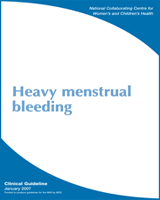
The NHS NICE (National Institue for Clinical Excellence) Heavy Menstrual bleeding guideline (HMB) Guideline – CG44 was published in 2007. The HMB Patient Guide to Treating Heavy Periods is available for FREE download here:
CLICK HERE TO VIEW The Patients Guide to Treatments
You can read & search the FULL HMB Guideline HERE
CLICK HERE for the FREE DOWNLOAD of the full , Evidence based 2007 UK Heavy Menstrual Bleeding (HMB) GUIDELINE for Patients & NHS Healthcare Providers: with full research & evidence on treating Heavy Periods including recommended Drug Treatments & Surgery with or without Fibroids Published January 2007 . Please note that this Guideline is being reviewed with a current target date of March 2016, particularly in respect of medical Treatments for Fibroids.
HMB Guideline Updates:
The Guideline wishes practitioners & patients to be aware that ‘Oral progestogen (norethisterone)which was previously recommended , is not licensed for use as a contraceptive, but may affect a woman’s ability to become pregnant while it is being taken. This is one of a number of treatments , due for review. Please see website
Patient Feedback Post 2007 HMB Guideline
From a patients perspective, we would also want an urgent NHS review of all medical & surgical treatments, including Hormonal Contraceptives & Mirena , which are now being used as treatment for Menorrhagia & Fibroids. We have received Patient feedback, that Women with Fibroids are not being given full informed choice of treatments available , including Uterine Fibroid Embolisation & Myomectomy in situations where it is recommended in the guideline.
Women have told us that they are only being offered Medical treatments or Hysterectomy. They have also stated that they have not been given written information about their Menorrhagia (Heavy Periods) or Fibroids, and the full rage of options available, to assist in their decision making. They have also not been advised of the Risks & benefits of the Medical Treatments & Hormonal Contraceptives offered. And they have not been told that if they have relief from symptoms, using medical treatments, the relief only lasts as long as the medical treatment is being taken & the symptoms are likely to resume if medical treatment is discontinued.
We have also had feedback that even where further fertility is not desired by a woman, Doctors are not considering some patients desires , not to be given a premature surgical menopause by having a Hysterectomy (Womb Removal).
The average age of first birth to mothers , in the UK, is now approximately 31 & rising. The average age of menopause is now approximately 51, for UK women. Women are seeking treatment for Fibroids & or Menorrhagia, throughou puberty, to post menopause . Doctors should always take into account the Patients preferences for treatment .
Patients are also concerned about being kept, on medical treatments , which have failed & then only offered another type of medical Treatment, endometrial ablation or Hysterectomy, when they desire to become pregnant. There is some patient evidence, of non compliance of UK Drs with the recommendations of the Guideline. We are also concerned that Drs are not monitoring why some medical treatments are failing, for women with fibroids & tailoring the treatments to the Patients needs. Rather than simply reporting that there are a number of women who have been given medical treatment & then given them a different medical treatment. We ask that Doctors , research & report on the reasons why a small, but significant proportion of women, have found some medical treatments & endometrial ablation ineffective , in order to identify this patient category, which may undermine the cost-effectiveness of these treatments, leading to re-interventions.
We ask that the number & type of treatments offered to women are fully recorded in the HMB audits. It is also, important to Audit, the Patients experience of time from 1st diagnosis on the NHS to a successful treatment & all interventions taken before they achieve a successful outcome. This would assist to identify which Treatment modalities & Care settings are most & least effective. And the full amount of years that women have been kept on medical treatment alternatives to Myomectomy, Uterine Artery embolization & Hysterectomy, to assist in identifying which treatments are more likely to result in re-interventions that ultimately lead to Hysterectomy which women inform us they do not want. Patients feel that they are not being given Informed Choice by Doctors not offering alternatives to Medical Treatments, endometrial ablation, or Hysterectomy, contrary to the HMB Guideline. Overview of the UK Doctors, post 2007 HMB Guideline Audit
Final Report of the UK National Audit Report Published July 2014 There is a considerable amount of Missing Data in relation to Patients experiences of medical treatments & surgical treatments & why a small but significant amount of women chose hysterectomy after having medical treatment, despite having an over 80% satisfaction rate. It is also unclear what patient information (if any) were provided to women and whether the information given was sufficient to assist women in their initial decisions re treatment. We note that in the 1st HMB Audit (click here), the researchers recorded that a significant amount of women, had had previous medical treatment within 5 years of the current consultation. Unfortunately, in later HMB Audits. The later, HMB audits, restricted inclusion of information on previous treatments for Menorrhagia to 1 year before the consultation. This means that the final report doesn’t show what proportion of women were re treated following treatment post, the 2007 HMB Guideline. Its not clear, what proportion of women being treated for Menorrhagia & /or Fibroids each year are people returning because medical treatments failed or , or weren’t tolerated or whether there were issues that weren’t audited that increased drop pot rates. We would suggest that this information is included as it would assist in measuring the Patients experience , outcomes & identify which Patient Categories are most likely to benefit or not benefit from each treatment.
Endometrial ablation, may not be effective for larger fibroids, and is not necessarily recommended for women who desire to have children. Surgical treatments for Fibroids, such as Myomectomy and Uterine Fibroid Embolisation (Minimal surgery to shrink the fibroids), have provided women with, improved long term outcomes, for removing/shrinking fibroids, preserving fertility & relieving symptoms from symptomatic fibroids, without the need to rely on long term medication, or resort to hysterectomy. We ask that Doctors also discuss the full range of treatment options that may be suitable for the woman , rather than just offering a narrow selection of, medical treatment ie contraception, or castration. All of the above treatments mentioned are available on the NHS.
Patient HMB update
Bridgette York, Fibroid Network
